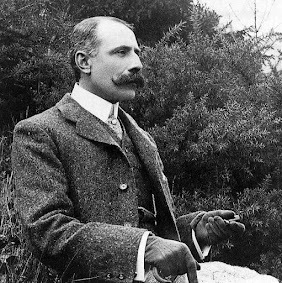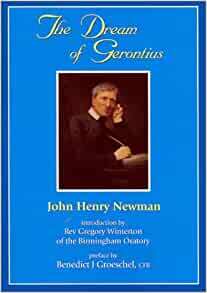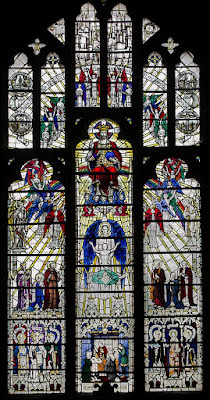Preview: The Premiere of Elgar's "Dream of Gerontius", 1900
 There's yet another new recording of Sir Edward Elgar's Dream of Gerontius (from Finland!), based on Saint John Henry Newman's epic poem--in scope if not in length--of the Four Last Things. The last recording won multiple awards this year.
There's yet another new recording of Sir Edward Elgar's Dream of Gerontius (from Finland!), based on Saint John Henry Newman's epic poem--in scope if not in length--of the Four Last Things. The last recording won multiple awards this year. And yet when it premiered in 1900 in Birmingham, things did not go well, and reviews of performances lately often include comments about "how Catholic" and esoteric the work is, qualified by praise of the music and orchestration! Nevertheless, it's an often performed and recorded choral masterpiece.
Since this year marks the 125th anniversary of Elgar composing it and of its premier in 1900, it's up next in our Son Rise Morning Show 2025 Anniversaries series on Monday, August 25. I'll be on the air around 7:50 a.m. Eastern/6:50 a.m. Central. Please listen live here or catch the podcast later here.
Elgar (June 2, 1857-February 23, 1934) composed this work (not really an oratorio) 60 years after Saint John Henry Newman wrote the Dream of Gerontius in 1865--so 2025 is also the 160th anniversary of the poem from which Elgar excerpted sections.
Edward Elgar's mother Ann was a convert to Catholicism while his father remained Anglican; Edward was baptized and raised Catholic. His father William disapproved--while at the same time serving as the organist at Saint George's Catholic Church in Worcester from 1846 to 1885--and became a Catholic on his deathbed! As the BBC classical magazine website explains, Elgar was coming off the great success of the Enigma Variations in 1900 when he decided to compose a great choral work based on Newman's poem for the Three Choirs Festival in Birmingham that year. He composed quickly and concluded that "This is the best of me; for the rest, I ate, and drank, and slept, loved and hated, like another: my life was as the vapour and is not; but this I saw and knew; this, if anything of mine, is worth your memory."
Unfortunately,
the first performance was plagued by mishaps. The choirmaster, Charles Swinnerton Heap, died shortly after rehearsals began and was replaced by the ageing William Stockley, who wasn’t equal to the task and who, in any case, didn’t try to mask his distaste for the subject matter. Hans Richter, the conductor, only received the full score one day before orchestra rehearsals began and only one of the soloists was in good voice on the day. Although the press generally conceded that a decent work had been presented, it was widely accepted that the first performance had been a disaster.Fortunately,
The German conductor Julius Buths was in the Birmingham audience and recognised that Gerontius merited a decent hearing. It was Buths’s performances in Düsseldorf in 1901 and ’02 that alerted the British musical world to the fact that Elgar had indeed produced something extraordinary. The occasions were a huge success, Elgar was fêted as a hero and was presented with two enormous laurel wreaths which he and Alice somehow managed to lug back to Malvern. Richard Strauss wrote ‘I raise my glass to the welfare and success of the first English progressivist, Meister Elgar’. If the Catholic Elgar hadn’t arrived before, the Anglican establishment had no choice but to concede that he certainly had done so now.

In spite of reviews like this (or in deviance of them!), Elgar's Dream of Gerontius is one of my favorite works. I've three recordings on CD and the DVD record of a great performance at Canterbury Cathedral by Dame Janet Baker as the Angel and Peter Pears as Gerontius/the Soul, conducted by Sir Adrian Boult.
When my mother was in her final days, I was called by the Hospice nurse to come early one more morning and I took my 1962 Roman Missal with the prayers for the dying. When I prayed the priest's prayer "PROFICISCERE, anima Christiana, de hoc mundo!"--
Go forth upon thy journey, Christian soul!Go from this world! Go, in the name of God
The omnipotent Father, who created thee!
Go, in the name of Jesus Christ, our Lord,
Son of the living God, who bled for thee!
Go, in the name of the Holy Spirit, who
Hath been poured out on thee! Go, in the name
Of Angels and Archangels; in the name
Of Thrones and Dominations; in the name
Of Princedoms and of Powers; and in the name
Of Cherubim and Seraphim, go forth! . . .
--I heard Elgar's music in my "mind's ear"!
 What's sad about Elgar's own life is that the initial failure of the Dream of Gerontius had lasting effects on his faith in God and religious devotion, as this website explains:
What's sad about Elgar's own life is that the initial failure of the Dream of Gerontius had lasting effects on his faith in God and religious devotion, as this website explains:
Ironically, it was the early failure of The Dream of Gerontius itself that led him to make the oft-quoted remark “I always knew God was against art…”, continuing “I have allowed my heart to open once – it is now shut against every religious feeling…”, this shortly before beginning work on The Apostles and The Kingdom, two oratorios viewed from an admittedly more neutral religious perspective.
As he grew older, his belief gradually withered. Although on his deathbed he is reported to have reaffirmed his commitment to the Roman Catholic faith and, while unconscious, received the last rites, he had not attended a church service for many a year. He claimed to have no belief in a life after death and to have taken exception to the dogma of the Catholic liturgy.That same website offers a snarky comment about Elgar's memorial stained glass window being in the Anglican Worcester Cathedral (image use under the Creative Commons Attribution 2.0 Generic license: "The Elgar Window by A. K. Nicholson, 1935, based on the Dream of Gerontius. The window shows Gerontius ascending to the Heavenly City, surrounded by figures from the Bible [?]*."
I could be snarky too and point out that Worcester Cathedral was a Catholic church from 680 to 1535 (and 1555-1559 during Mary I's reign)! *There are Catholic saints depicted there, including two canonized bishops of Worcester, Oswald and Wulfstan, Saint Cecilia, Saint Gregory the Great, Saint Francis of Assisi, Saint Peter (with the keys!) the Blessed Virgin Mary, Saint Joseph, and King David with his harp, etc.
The memorial plaque to Elgar in the cathedral includes the words from the prayers he may or may not have heard on his deathbed: "PROFICISCERE, anima Christiana, de hoc mundo!"
Edward Elgar and his wife Alice are buried in the cemetery of St. Wulstan’s Catholic Church at Little Malvern in Worcestershire, where a 75th anniversary memorial Mass was offered for him in 2009.
May Edward and Alice Elgar rest in peace!
Saint John Henry Newman, pray for us!
Image Credit (Public Domain): English composer Edward Elgar, likely in the early 1900s.



